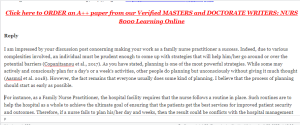Sample Answer for INTRA- AND INTERDISCIPLINARY COLLABORATIVE PRACTICE NURS 8000 Included After Question
INTRA- AND INTERDISCIPLINARY COLLABORATIVE PRACTICE NURS 8000
Week 3
Initial Post
Nurs-8000
Evaluate the value of intra and interprofessional collaborative practice as a DNP or PhD prepared nurse and how it may impact your role.
As leaders’ nurses must act as full partners in redesign efforts to be accountable for their own contributions to deliver high quality care and work collaboratively with leaders from other health professions (IOM, 2010). The value in interprofessional collaboration as a DNP comes in the form of patient outcomes. Working independent serves as no true value to the patient thus allows for fragmented care and poor patient outcomes. When the DNP works with an interdisciplinary team more is accomplished because you have different professionals i.e., the physician, bedside nurse, social worker working for one common goal, which is to yield optimum patient outcomes.
According to Laureate education (2011), As a DNP you have the role of:
- Coordinating patient care
- Opportunity to be at the same level as other professionals
- Your opinion and skills are more recognized
- Able to collaborate with other nurses and disciplines
- Lead other nurses and healthcare providers
Two detailed examples that support Response
In interviewing the Chief nursing executive at my hospital, she stated that the biggest advice that she could give which has also been her flaw; was that of not Listening before responding and taking feedback into consideration. She went on to say that she always came up with solutions but it was not right, because she failed to explore other individuals on her team ideas.
My future role as a DNP, will allow me to coordinate with other professionals and make way for innovation as well as strategic planning, in efforts to maximize patient center care. In its simplest form collaboration implies collective action toward a common goal in a spirit of trust and harmony (D’amour, Ferrada-Videla, San Martin Rodriquez, and Beaulieu, 2005;Zaccagnini & Pechacek, 2021).
Reference:
Institute of Medicine (IOM), (2010b). The future of nursing, leading change, advancing health Report brief Retrieved form https://web.archive.org/web/20150203150734/http://iom.edu/~/media/Files/Report%20Files/2010/The-Future-of-Nursing/Future%20of%20Nursing%202010%20Report%20Brief.pdf
Laureate Education (Producer), (2010d). The professional role of the DNP prepared nurse [Video file]. Retrieved from https://class.waldenu.edu
Zaccagnini, M.& Pechacek, J.M. (2021). The doctor of nursing practice essentials: A new model for advanced practice nursing (4th ed.). Jones & Bartlett
A Sample Answer For the Assignment: INTRA- AND INTERDISCIPLINARY COLLABORATIVE PRACTICE NURS 8000
Title: INTRA- AND INTERDISCIPLINARY COLLABORATIVE PRACTICE NURS 8000
INTRA- AND INTERDISCIPLINARY COLLABORATIVE PRACTICE NURS 8000
INTRA- AND INTERDISCIPLINARY COLLABORATIVE PRACTICE NURS 8000
The Institute of Medicine (IOM) report The Future of Nursing: Leading Change, Advancing Health in this week’s Learning Resources indicates there are 3 million members of the nursing profession in the United States, composing the largest segment of health care workers. As the health care field continues to evolve, nurses with advanced degrees are likely to fulfill leadership roles and work collaboratively with other health care professionals to improve access to care and promote quality. The AACN and the IOM stress the importance of intra- and interprofessional collaboration.
In this week’s media presentation, “The Professional Role of the DNP Prepared Nurse,” Dr. Stanley, Dr. Stefan, and Dr. Beechinor discuss the value of intra- and interprofessional collaboration across the spectrum of health care delivery. Dr. Beechinor also speaks about the benefits of engaging in collaboration during a doctoral program, and how this can aid students as they prepare for new professional roles. The experts also discuss why collaboration is essential for nursing research.
To prepare:
- With information from the Learning Resources in mind, consider the value of intra- and interprofessional collaborative practice in professional practice and as you engage in your doctoral studies. What opportunities do you see for engaging in intra- and interprofessional collaborative practice?
By Day 3
Post a cohesive response that addresses the following:
- Evaluate the value of intra- and interprofessional collaborative practice as a DNP or PhD prepared nurse and how it may impact your role.
- Provide at least two detailed examples to support your response.
Read a selection of your colleagues’ postings.
Click here to ORDER an A++ paper from our Verified MASTERS and DOCTORATE WRITERS: INTRA- AND INTERDISCIPLINARY COLLABORATIVE PRACTICE NURS 8000
By Day 6
Respond to at least two of your colleagues, sharing additional insights into how new roles for the doctorally prepared nurse require intra- and interprofessional collaboration.
Submission and Grading Information
Grading Criteria
To access your rubric:
Week 3 Discussion Rubric
INTRA- AND INTERDISCIPLINARY COLLABORATIVE PRACTICE NURS 8000
Post by Day 3 and Respond by Day 6
To participate in this Discussion:
Week 3 Discussion
Courtney Jones
RE: Discussion – Week 3
Collapse
Top of Form

Collaboration with others is essential in health care without discrimination of title or job compacity. Nurses prepared at the doctoral level must be able to work and consider the opinions of other healthcare team members. Vega and Bernard (2016) assert interprofessional collaboration (IPC) is defined by multiple healthcare workers from various professional backgrounds working together to achieve the optimal level of patient care. Doctorally prepared nurses strive to increase knowledge and work towards the better good of society. IPC encourages greater communication between a diverse group of professional leading to fewer health care errors and sentinel events (Vega & Benard, 2016).
The Institute of Medicine (2010b) suggests as leaders nurses must create a partnership with other health disciplines through collaboration to cultivate change. As a psychiatric mental health nurse practitioner (PMHNP), I work very closely with psychologists and therapists. As a PMHNP, I often collaborate with psychologists for disease-specific testing to help guide my treatment planning. Likewise, it is also essential for me to collaborate with therapists to monitor the progress of a patient’s ability to use adaptive coping skills. As a nurse pursuing a Doctor of Nursing Practice (DNP), I will continue to work closely with psychologists and therapists to help my specific patient population achieve their optimal outcome. I believe upon completion of the DNP program I will have a greater appreciation of the input of other disciplines.
DNP-prepared nurses must also be able to collaborate within their own discipline. Intraprofessional collaboration not only helps with promoting optimal outcomes but it encourages personal growth, Intraprofessional collaboration is achieved when nursing hierarchies are addressed, nurses have a clear understanding of their role, and are allowed to practice to their full scope (as cited in Lanshear, 2019). Nurses who have a clear understanding of their role and work to their full scope of practice promote intraprofessional collaboration and higher team functioning leading to an enhanced health care system ( as cited in Lanshear, 2019).
Personally, I work with nurses educated at the undergraduate level as well as nursing support professionals. As a nurse pursuing a doctoral degree, I plan to ensure each nursing discipline has a clear understanding of their role as well as a clear understanding of my role, so high team functioning is achieved. For example, the certified medical assistance will understand he or she is the first person the patient encounters and that their role of collecting vitals is equally as important as the registered nurse’s job duty of collecting pertinent history. As a nurse seeking a DNP degree, I will encourage clarity and communication within my discipline to improve healthcare outcomes.
Courtney
References
Bernard, A. and Vega, C.P. (2016). Interprofessional collaboration to Improve health care: An Introduction. Retrieved from https://www.medscape.org/viewarticle/857823#:~:text=Interprofessional%20collaboration%20is%20defined%20as,providers%20consider%20each%20other%27s%20perspective%2C
Institute of Medicine (IOM). (2010b). The future of nursing: Leading change, advancing health {Report brief]. Retrieved from https://web.archive.org/web/20150203150734/http://iom.edu/~/media/Files/Report%20Files/2010/The-Future-of-Nursing/Future%20of%20Nursing%202010%20Report%20Brief.pdf
Lanshear, S. ( 2019). Intraprofessional collaboration: timing is everything. Retrieved from https://canadian-nurse.com/en/articles/issues/2019/may-2019/intra-professional-collaboration-timing-is-everything
Reply Quote Email Author
Bottom of Form
Hide 8 replies
Message Unread
Mark as Unread
Message Not Flagged
Set Flag
1 year ago
Margaret Harvey Walden Instructor Manager
RE: Discussion – Week 3
Collapse
Top of Form
Courtney,
You have some really good examples of these types of collaboration and how you will continue to collaborate once you earn your degree. By implementing interprofessional collaboration and learning to work together and respecting one another’s perspectives in how we approach healthcare, we can strive to work more effectively as teams to help improve patient outcomes. I think we sometimes forget that healthcare is very dependent on many different disciples working together. Nursing research demonstrates that patient outcomes, the cost of healthcare delivery, and the quality of patient care, are all optimized when professionals from various disciplines work together toward a shared goal, with the focus being on the patient.
It does not sound that difficult to collaborate together to me. Yet when I really stop and think about it, and the fact that every discipline went to a college to seek a specific specialty, whether that is nursing school, pharmacy school, medical school, physical therapy or occupational therapy school—each of the disciplines was really immersed in a solitary perspective. Realizing that, it can be a real feat to get everyone working toward the same goal and collaborating. I think the fact that we all identify ourselves as being an integral part of the team who works toward patient wellness and care, allows up to work together to ensure patient outcomes are good.
Working together is supposed to decrease patient costs and reduce inefficiencies. Have you seen a different in the willingness to collaborate based on the team member’s educational level? How would you handle someone you supervised who did not want to collaborate with other disciplines?
Thank you for sharing. I enjoyed reading your post!
Dr. Harvey


